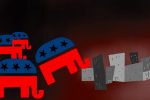Liberal arts colleges are renowned for their rigorous academics and close-knit communities, designed precisely to foster dialogue and critical thought. Undergraduates at these schools enjoy multidisciplinary curricula with a large focus on the humanities, so it comes as no surprise to note that liberal arts colleges house some of the most politically active students in the nation, which is one of the biggest downsides of liberal arts colleges.
However, these academics supposedly created for the pursuit of knowledge, advertised as having compassionate and open-minded students, are remarkably ill-equipped to include students who deviate from the majority-leftist campus norm. In a place meant for development of individual opinions, small liberal arts colleges do their students a disservice by failing to protect the diversity of thought.
At small liberal arts colleges, the student population is vastly liberal or left-leaning, which is not a problem unto itself. Higher education has historically been heavily populated by progressives. The issue arises when the left-leaning majority fails to listen to anybody whose opinions marginally differ from theirs and ultimately flag dissenters as immoral, as bigots and as small-minded.
In a study done on 159 American college and university campuses, data show that university students are far less likely to object to a speaker’s right to speak than liberal arts students are: 37% of regular university students and 52% of liberal arts students consider that kind of censorship acceptable in the case of a controversial guest. Liberal arts students are willing to sacrifice free speech for the sake of keeping the waters calm to a greater degree than their university counterparts.
The leftism at these small colleges does not inspire diverse spaces for civil discussion but rather creates echo chambers for people to push each other further to political extremes. To openly disagree with leftist ideas is to excommunicate yourself from the greater community. Admonishment from peers is sufficient motivation for students to keep quiet when it comes to potentially volatile opinions.
In an opinion piece for the New York Times, undergraduate Emma Camp criticized the “strict ideological conformity” she found on her college campus and expressed her disappointment at the lack of open discussion. What has been called “cancel culture” is so prevalent on these campuses that free speech, although not explicitly limited, is not a given. A particularly notable downside of liberal arts colleges and an example of limited freedom of speech can be found at Brandeis University, a liberal arts college with less than six thousand undergraduates. In 2021, the university released a list of words to avoid, citing them as oppressive language. The list includes innocuous and inoffensive words and phrases such as “policeman,” “rule of thumb”, and “you guys.”
Faculty at liberal arts colleges are overwhelmingly Democrats, so the rigid homogeneity of thought is also upheld by the professors. Data from a study of the top non-religious liberal arts colleges in America reveal that the ratio of Democrat to Republican professors is a whopping 10.4:1, or 12.7:1 if the military colleges are excluded from the definition of “liberal arts college.” Further, liberal arts colleges boast challenging and invigorating humanities courses, which is not intrinsically harmful but becomes concerning when researchers claim that the humanities departments promote moral absolutism, obliterating nuance in favor of definitive moral truth.
These researchers claim that the impact of strong left-leaning influence without counterbalance is “comparable to the moral influence of adolescent religion” and “imparts a sense of moral absolutism that rivals the effects of religiosity.” Absolutism without relativism disregards critical thinking, as students from these colleges subscribe to such rigid morality that any slight deviation is reprehensible.
Such moral absolutism abolishes curiosity, as questioning the doctrine is social suicide. Being wrong and being informed accordingly are pillars of education, and the environment liberal arts students find themselves in prevents this process from occurring. Peer review happens naturally as people exchange opinions and express their beliefs.
To exist in a community where this does not happen, where dissent is perceived as antagonism and met with indignation, is to be denied a fundamental part of learning and growth. When nobody extends grace to fellow students and affords them the space to be wrong or misinformed, the pursuit of knowledge halts, and the pursuit of moral conformity commences. Where there is no outward diversity of thought, there is stunted growth and discouraged creativity.
With this in mind, it is important to examine the reasons for preserving these campus environments. For students of marginalized communities, existing in a space where people hesitate to speak on sensitive subjects, can be a welcome change from unsolicited and possibly irreverent comments in the outside world.
Because insensitivity can be socially harmful, many people find long-sought tolerance at liberal arts schools. Queer students, in particular, seek out liberal arts colleges for the safety they offer. 38% of students at these schools identify as LGBT, compared to the 19% of Gen Z that identify similarly. The leftist environment at these schools can be conducive to unadulterated self-expression and -exploration.
What the students of these colleges fail to understand is that intolerance of prejudice can coexist with diverse ideologies. Tolerant communities do not necessarily need to be echo chambers. The act of subduing prejudice does not equate to the act of subduing all non-leftist opinions.
College is meant to be a place for learning and personal growth and a stepping stone to the working world, and preventing high education institutions from being that is the biggest downside of liberal arts colleges.
When campus becomes a place where healthy, respectful discussions cannot take place and where opinions that differ from the majority consensus are met with anger and not curiosity, college stops serving its purpose to its fullest extent. Spending years in a place where the population seems ideologically monolithic creates a new generation of people entering the workforce who are unable to engage with people with opposing opinions.
The ability to eloquently articulate opinions is imperative to success in the world; in colleges where only one viewpoint is ever expressed, students get no practice and leave their studies unprepared. Small liberal arts colleges fail their students by encouraging the development of these echo chambers. In the name of open-mindedness and protection of the student body from allegedly unsavory opinions, these colleges blindly become closed-minded, the very thing they fear most.
















